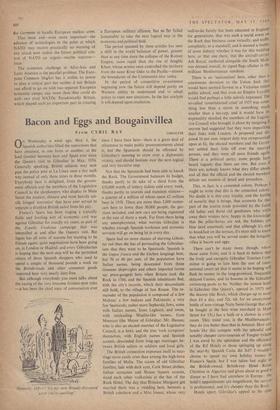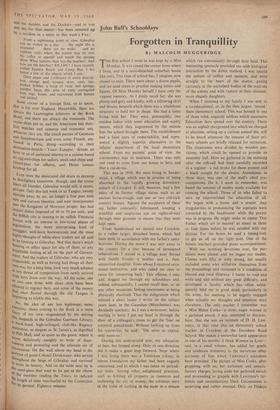Bacon and Eggs and Bougainvillea
From CYRIL RAY
GIBRALTAR
ON Wednesday a week ago, May 4, the Spanish authorities lifted the restrictions that have obtained, in one form or another, at the land frontier between here and Spain ever since the Queen's visit to Gibraltar in May, 1954. Generally speaking, British subjects may now pass the police post at La Linea once a day each Way instead of only three times in three months. Eyerybody here is delighted, from the govern- ment officials and the members of the Legislative Council to the shopkeepers who display in Main Street the nastiest, shiniest and most heavily art- silk fringed 'souvenirs' that have ever served to separate a drunken British sailor from his pay.
Franco's Spain has been waging a typically futile and footling sort of economic cool war against Gibraltar for exactly six years, as part of the Espana lrredenta campaign that was intensified at and after the Queen's visit. But Spain has all sorts of reasons for wanting to be friends again; quiet negotiations have been going on, in London or Madrid; and every Gibraltarian is hoping that the next step will be the permitted return of those Spanish shoppers who used to spend a couple of thousand pounds a week on the British-made and other consumer goods imported here very nearly duty-free.
But although everybody you meet talks about the easing of the very tiresome frontier-post rules —it has been the chief topic of conversation ever 'lloneatly, (Miro.. it's my new Brandy-flavoured .went pnr're since I have been here—there is a great deal of reluctance to make public pronouncements about it lest the Spaniards should be offended by Gibraltar's seeming to crow over a diplomatic victory, and should hesitate over the next logical and very lucrative step.
Not that the Spaniards had been able to knock the Rock. The Government balances its budget, thanks partly to its take of a third from the £10,000 worth of lottery tickets sold every week, thanks partly to tourists and transient visitors— a quarter of a million of whom spent £2 million here in 1958. There are more than 3,000 motor- cars here to fewer than 30,000 people, the gar- rison included, and new cars are being registered at the rate of thirty a week. Far from there being any unemployment, what worries Gibraltar is whether enough Spanish workmen and domestic servants will go on being let in every day.
Spain had no more chance of starving Gibral- tar out than she has of persuading the Gibraltar- ians that they want to be Spaniards. Spanish is the lingua franca and the kitchen language here, but 70 or 80 per cent. of the population have Italian names, being descended from those Genoese shipwrights and others imported (some say press-ganged) here when Britain took the Rock in 1704, and the Spanish inhabitants fled, with the city's records, which their descendants still hold, to the village of San Roque. The re- mainder of the population is composed of a few Maltese; a few Indians and Pakistanis; a very few Spaniards; rather more Sephardic Jews, some with Italian names, from Leghorn, and some, with misleading Muslim-like names, from Morocco (the Mayor of Gibraltar, Mr. Hassan, who is also an elected member of the Legislative Council, is a Jew); and the true 'rock scorpions' themselves, with English names and Spanish accents, descended from long-ago marriages be- tween British sailors or soldiers and local girls.
The British connection expresses itself in mar- riage more easily even than among the high-born families of Malta. The scions of old Gibraltar families, lads with dark eyes, Cork Street clothes, Italian surnames and Sloane Square accents, stand each other vodkatinis at the bar of the Rock Hotel. The day that princess Margaret got married there was a wedding here, between a British subaltern and a Miss Imossi, whose very well-to-do family has been educated in England for generations, that was such a social event on the Rock that business came virtually, and traffic completely, to a standstill, and it seemed a matter of some dubiety whether it was for this wedding here, or that one there, that the aircraft-carrtcr Ark Royal, anchored alongside the South Mole. was dressed overall, its signal flags aflutter in the brilliant Mediterranean sunshine.
There is no 'nationalism' here, other than a unanimous devotion to the Union Jack that would have seemed fervent in a Victorian minor public school, and that even an Empire Loyalist would find perhaps a little naively expressed. The so-called 'constitutional crisis' of 1955 was some- thing less than a storm in something much smaller than a tea-cup, and it would have in- expressibly shocked the members of the Legisla- tive Council who brought it about by resigning if anyone had suggested that they were imperilling their links with London. A proposed and dis- puted 10 per cent. import duty was compromised upon at 81, the elected members and the Gover- nor settled their little tiff over the reserved powers, and they were all soon friends again. There is a political party; some people have heard vaguely that there are two. But even if there are, nobody knows what they differ about, and all that the official and the elected members debate are matters of detail and procedure.
This, in fact, is a contented colony. Perhaps I ought to write that this is the contented colonY. No doubt it is this cosy loyalty, and the feeling of security that it brings, that accounts for that part of the tourist trade provided by the faded old ladies and florid old gentlemen who while away their winters here, happy in the knowledge that the pillar-boxes are red, the bobbies are blue (and unarmed), and that although it's nice to breakfast on the terrace, it's nicer still to know that what you will be served under the bougain- villea is bacon and eggs.
There can't be many more, though, where those came from, and it is hard to believe that the lively and energetic Gibraltar Tourism Corn- mittee is going to lure here the sort of inter- national smart set that it seems to be hoping will flash its money in the long-promised, frequentlY delayed Casino, and its bosoms in the Gibraltar swimming-pools to be. Neither the newest hotel in Gibraltar (the Queen's, opened in 1957) Of the dearest (the Rock, which charges up to more than £4 a day, and 52s. 6d. for an anonymous bottle of non-vintage Nuits Saint-George that can be bought at the best wine merchant in Main Street for 15s.) has a bath or a shower to ever)/ room. This, mind you, is the Mediterranean: they, do you better than that in Amman. How can hotels like this compete with the splendid and notably cheaper caravanserais of Tangier (where I was awed by the splendour and the efficiencY of the Rif Hotel) or those springing up along the near-by Spanish Costa del Sol? I wouldn't choose to spend my own holiday money in Franco's Spain, but I was taken last night to the British-owned, British-run Hotel Reina Christina in Algeciras and given about as good a dinner as I have had anywhere in Europe: the hotel's appointments are magnificent, the ser \ ice is professional, and it's cheaper than the Rock.
Hotels apart, Gibraltar's appeal to the debs
and the dandies and the Dockers--and to you and me. for that matter—has been summed up In a resident in a letter to this week's Vox: From a sightseeing point of view. Gibraltar can be visited in a day . . . the night life is restricted . there are no walks . and no outdoor cafés where the tourist may sit over his coffee or aperitif and watch the passing' show. What remains then but the beaches? And how are the beaches? FILTHY! I have recently visited Eastern Beach and Camp Bay. 1 li,t below a few of the objects which I saw : Dirty paper and cardboard ot every descrip- tion, orange peel, banana skins, rusty tins, broken bottles, a heap of rusty bed springs, another heap, this time of rusty corrugated iron, rags, bones, and excrement both human and animal
Some corner of a foreign field, so to speak, that is for ever England. Meanwhile, there are always the Leamington leftovers at the Rock Hotel, and there are always the transients. The cruise ships put in, and the Americans buy duty- free watches and cameras and transistor sets, whatever they are. The coach parties of Germans and Scandinavians and even some French, em- bussed in Paris, doing—according to their destination-boards-7oute Espagne,' devote an hour or so of quizzical interest to a cuisine based on egg-and-chips for sailors, steak-and-chips-and- tinned-peas for officers. and Heinz tomato ketchup for all.
Even were the desiccated old dears to decamp to Bordighera tomorrow, though, and the cruise liners all founder, Gibraltar would still, it seems, Prosper. Only this last week or so Tangier, twenty minutes away by air, no longer a free port with rare and curious liberties, and now incorporated into the Kingdom Of Morocco proper, has had•imPort duties imposed of 40 or 50 per cent., and the Riffish city is ceasing to be raffish. Financial houses with an interest in low-taxed places of registration. the more enterprising kind of striuggler, well-born homosexuals and the most highlY-thought-of white-slave traders are all said to be looking to Gibraltar. Not that there's much housing or office space for any of them, or any hospitable feeling at all on the part of Govern- ment. And the traders of Gibraltar, who are very respectable, as well as having had things all their Own way for a long time, look very much askance at any threat of competition from newly arrived Wide boys from over the way. All the same, one Or two new firms with clean chits have been allowed to register here, and some of the money that Once flowed through the old Tangier is beginning to trickle this way.
No, the idea of any less legitimate, more rf°tnantic, rhino coming to the Rock is a mere ,,aneY of my own—engendered by my writing inis despatch in the Gibraltar Garrison Library, book-lined, high-ceilinged, club-like Regency institution, as elegant as St. James's, as dignified as Pall Mall, and as quiet as the grave, where it seeins deliciously naughty to write of dope. running and procuring and the ultimate sin of tax-evasion. On the wall above my head is the Portrait of good Colonel Drinkwater, who served throughout the Seige of Gibraltar and survived t° write its history. And on the table near by is the sand-Wass that used to be put at the elbow r the member reading the Times, to indicate Pe length of time vouchsafed by the Committee or its perusal. Eighteen minutes.





































 Previous page
Previous page